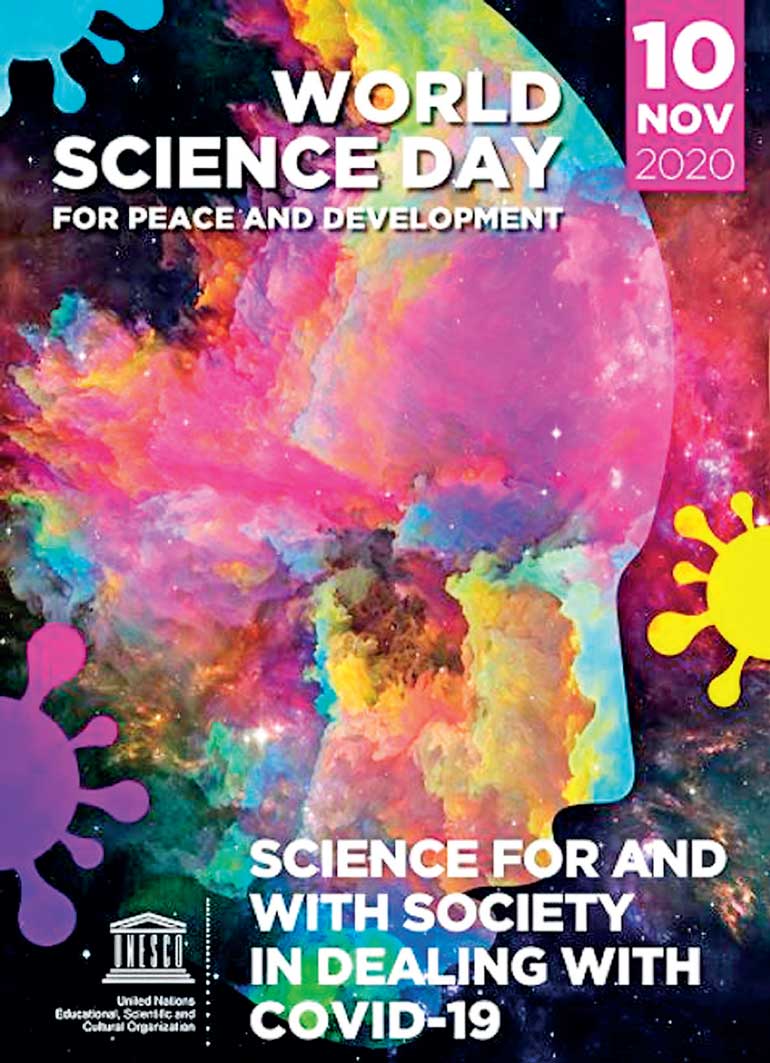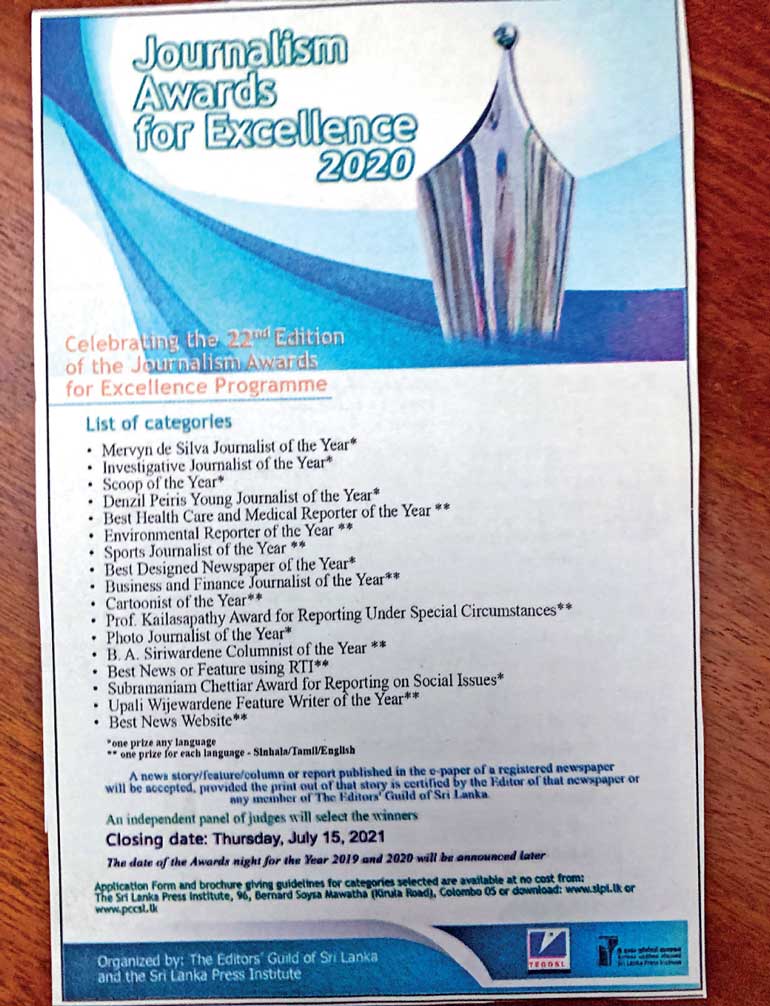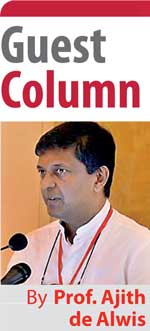Monday Feb 16, 2026
Monday Feb 16, 2026
Thursday, 4 November 2021 00:00 - - {{hitsCtrl.values.hits}}

World Science Day for Peace and Development is celebrated on 10 November every year to highlight the role of science in society. There is the need to communicate on the specific role played by science in shaping lives and society – lest we forget!

When media personnel are rewarded for their output, there is no award for science journalism. In some journalistic quarters, there is interest to know what nanotechnology is, yet science journalism cannot be achieved by investing only nanoseconds
The world will be celebrating science for peace and development in a few days on 10 November. Global Science Day is on 10 November and it is expected Sri Lanka too would be engaged with commitment this year.
Day is on 10 November and it is expected Sri Lanka too would be engaged with commitment this year.
There are countries which have their own National Science Day. India is an example where they have made their own Science Day on 28 February, the day when C.V. Raman discovered the spectroscopic effect – Raman Effect – that bears his name. Raman went on to be India’s first Nobel Laureate in Science.
We are witnessing many critical developments both at home and abroad. COP 26 in Glasgow is expected to take decisions of importance to the survivability of humanity and we are there too on stage. Science has to be deployed well with nation-mindedness. It is sad in many an event science is going partisan. We just cannot afford to have party-mindedness and most certainly with science.
I dare say even with political science that should not be so! Politicians should heed the science and not expect scientists to tell them what they like to hear. That responsibility of course lies with the scientists who should stay loyal to their principles and the scientific method of working.
We widely display our awareness of information and opinions flow quite freely at every opportunity. The fine art of displaying our literacy is impressive as they come from all quarters. The issue of serious concern however is with science literacy. Improving on this is a responsibility that lies with scientists too, which however critically depends on the presence of an enabling environment.
SLAAS and NAS
Two bodies of science and technology personnel Sri Lanka have are the Sri Lanka Society for the Advancement of Science (SLAAS) and the National Academy of Science (NAS). As two premier organisations with a membership spanning not only in Sri Lanka, these organisations offer policy and decision makers access to a significant body of knowledge and experience.
The institutions deliver value as well as feel valued, when the membership can deliver to decision making and when they see that their ideas are heeded and taken note of. When such internalisations are absent, the laws of unintended consequences can kick in and the results are quite chaotic. It does not take many decisions to change a situation to a complicated and chaotic one from relative calm.
It is interesting to note a designation applied to the National Academy of Science (NAS) in the United States of America. NAS in the USA has been considered as the Supreme Court of Science – if one senses a conflict the State turns to the National Academy of Science.
The Trump era in the United States must have dulled this linkage and the country has paid a huge price for doing so. Unfortunately, such as with the decision with the Paris Agreement, the USA acting unilaterally damages not only itself but the rest as well.
The importance and the relevance of science for navigating the way in today’s world are quite clear. However, if you lack the proper literacy then you may turn to star signs and nothing of use would materialise.
Sri Lanka not in a position of strength
The current position of our science is not at any position of strength though definitely far from being out. The inputs are quite low and we have one of the worst levels of investment.
Science and technology capacity is affected by both deficiencies in investments in education and in research and development. There is a significant brain drain in this sector which appears to have accelerated again with COVID.
It was sad to see the positioning of Sri Lanka when I was writing a letter of recommendation for a young colleague who was applying to a Fellowship. The Fellowship is open to any early career scientist in 66 scientifically and technologically lagging countries across all continents and the classification is explicit.
Sri Lanka appears in the list for Asia and Pacific. The specifically identified countries listed for Asia and the Pacific are Afghanistan, Bangladeshi, Bhutan, Cambodia, Kiribati, Laos, Mongolia, Myanmar, Nepal, Solomon Islands, Tajikistan, Timor, Leste, Tuvalu, and Vanuatu. I refrain from any additional qualifying comments here but knowing well the scientific and technological talent that we have, as well as we have had, over the years one can only express sadness seeing the country identified in this manner. While I wish the colleague all success I can only say that we have allowed knowledge to wither away, and institutions to decay with only a few exceptions.
Celebrating science
Embracing the celebration of science on a global scale was an initiative of UNESCO. World Science Day for Peace and Development is celebrated on 10 November every year to highlight the role of science in society. There is the need to communicate on the specific role played by science in shaping lives and society – lest we forget!
However, in Sri Lanka there is definitely the need and one must act on this day – considering the deficit we carry in society, we must not only use this day but perhaps every other day considering the enormous amount of issues that have emerged as a result of us not being alive to science. How can we dispel pseudo-science, which is so entrenched and powerful? This is not an issue of the past few years but a story which had been developing since independence.
UNESCO in addition comes out with a review of science in a global context every five years and the last one has an interesting message – More Research – Better Development! Four words we should take on with understanding as the National Budget is just around the corner too, along with Global Science Day. Our investment in research is again one of the lowest. Interestingly, the investment in moving solid waste around in one province apparently is more than the amount invested in research and development in our country!
Science journalism
The realities from the law of unintended consequences are aggravated by our media which has no qualms in supporting pseudo-science. It is interesting that year on year when media personnel are rewarded for their output, there is no award for science journalism.
At present in some journalistic quarters, there is desperate interest to know what nanotechnology is, yet science journalism cannot be achieved by investing only some nanoseconds. The harm that is created by lowering yourself just to please the masses and creating a vicious circle of continuously serving a low IQ diet of pseudo-science, low quality news, and plain garbage is significant. All for some advertising revenue and in pursuit of brand positions. The damage done is significant when you place your headlines based on ‘blood and stink’.
As we listen to COP26 proceedings and remarks from world leaders, it is quite clear that science has been accepted and not contested as one just cannot rebuke the findings. Most who are waiting outside the halls of Glasgow are sceptical, having listened to many a promise over the years. However, though the action may or may not come, science has positioned itself strongly to extract the commitments.
They also acknowledge, as the Australian PM did, that those who are not inside the building would actually be delivering and indicated that scientists and engineers would be finding solutions. I am sure some can point out the very issue is also as a legacy of advancement of science. One must understand science did deliver significant opportunities coupled with technologies. The masses actually misused and abused, which resulted in the current situation. Living beyond our means is adoption of opportunities unabashedly provided by science.
At least on 10 November, one may look at retrospectively where we were and where we are today. However, do not forget to contemplate where and how we are going to live out the future. Science has unravelled issues and is making it quite clear that we must travel a path different from what we were becoming used to. On the day and at this juncture, celebrating is not only about reminiscing about what science has done, it is also about what science is telling us and even more important with the future of the next generation in mind.
Code Red for Humanity is out and our media was missing in that news space. It is quite clear that we have to make several resolutions if we are to move ahead. A few more steps in the wrong direction and generating a few more generations of poorly guided citizens, the place we have come to live and love is quite likely to change irreversibly.